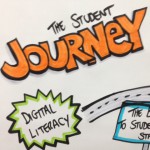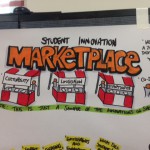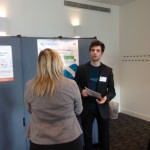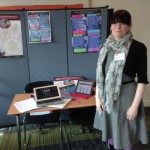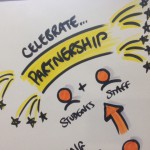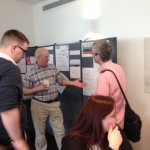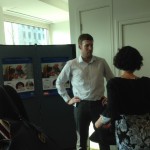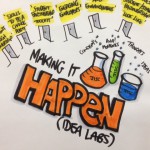On this page you will find some of the reflections from the event from student and staff participants. We will also be putting up some of the photos, and eventually video ‘vox pops’ that will help you get a flavour of the level of activity and conversations that happened over the 2 days.
Reflections:
From Stephen Singer, Jisc:
As the resident artist captures the final discussions of the first day at the Change Agent Network (CAN) event in Birmingham – it’s a good chance to reflect on what has been a wonderful and energetic celebration of student partnership across the sectors.
The first day saw the official launch of two new features of the Change Agent Network with Simon Walker introducing the new peer reviewed CAN Journal of Education, Innovation and Change. Mark Kerrigan followed with ‘CAN Learn’, the network’s online training and support site built using Moodle. The first cohort is underway and students are currently busy introducing themselves and discussing how they are contributing to partnership programmes in their institutions.
Student partnership is high on the agenda with senior leadership in institutions. Universities UK ran a recent conference on the subject of enhancing the student experience and stressed the message to the higher education sector that students should be seen as ‘partners at the centre of authentic student engagement‘. A challenge to the very idea that students should be seen as customers just because they pay fees for their education.
Ellie Russell revisited this theme in her excellent opening keynote on the work of The Student Engagement Partnership (TSEP) by stressing the importance of having a ‘shared understanding of student engagement’. This being essential if an institution is to succeed in making authentic student partnership a reality. By implementing student voice and democratic participation effectively this can demonstrate powerful outcomes, not just in terms of partnership but also the raising of student attainment. Something that is in the interest of all educators and students.
Ellie further argued that by creating student partnership and being inclusive, this removes the notion that students are powerful simply because they pay!
One of the great strengths of this event is hearing the innovative ways institutions are engaging in student partnership. Paul Chapman from Birmingham City University (BCU) explained how the work of TSEP and the materials they produce are working to support the conversations student leaders are having across their institution. BCU see the strength in student partnership getting to the heart of issues that drive the agenda of improvement – focussing their efforts on quality assurance. Through a process of recycling the student voice contributions and feedback into their PgCert and MEd education programmes, they ensure that teaching programmes are influencing and steering teaching quality. Feedback loops!
The opportunity to hear from institutions and students on their excellent practice demanded stamina as the network moved to an energetic carousel as they made their ‘pitches’.
Sarah Knight closed day one by asking for some reflection on what the change agent network can offer and some of the challenges that we face in delivering authentic student partnership. The challenge of using technology effectively to support this process is area that was raised in conversation throughout the day.
How can Jisc’s expertise be used to support institutions to engage not just with their students but also share the very best practice between institutions?
Really looking forward to the final day which I know will be full of enthusiasm, energy and a desire to share the best practice that is driving student partnership forward in institutions across the UK.
From Sarah Mullins, student (also post conference, Sarah posted on her blog – My reflection on the Change Agents’ Network Event http://wp.me/p5Gfz1-E ):
I’m incredibly passionate about the importance of student engagement and partnership and came to this event with the hope of learning how engagement could be enhanced through the use of digital technology. I guess I came feeling a little behind when it comes to digital awareness and wondered if it was too late to get involved, thinking everyone would be far ahead of me and the projects would be too advanced for my current level of understanding. However the discussions I’ve had shows that actually many of us are in the same place and there are some great projects that don’t require the technological experience I had expected. The fantastic enthusiasm and the variety of projects has inspired me to consider potential ideas that may be suitable for my institution and I intend on discussing these with the relevant members of staff when I get home. I’m really looking forward to hearing more about the toolkit today as I’m helping implement an internal student engagement conference soon and think this could be a really useful item for discussion.
This event has been a great opportunity to share ideas and discuss common goals, challenges and ideas.
From Rebecca Rochon, Senior Lecturer Academic Enhancement, Buckinghamshire New University
Day 1 has showcased the variety of ways that students can act as change agents- highlighting that partnership is about sharing a goal or an ethos as opposed to a particular type of activity.
The day also brought home what CAN has got right, and something I will definitely take away: the formal/informal approach to students as change agents.
At the formal level, there are forums for sharing practice (the journal), frameworks and tools ( the accreditation scheme and toolkit). Formal is important as it gives us tools for recognising what has happened. However, CAN also embraces the benefits of the informal; opportunities to share and discuss are essential to foster what was referred to by one presenter as ‘organic’ partnerships (Jim Pettiward/Chris O’Reilly).
LSE Student Journey: http://blogs.lse.ac.uk/lsesadl/2015/03/23/sadl-students-present-at-jisc-change-agents-network/

